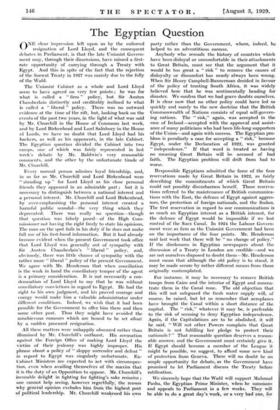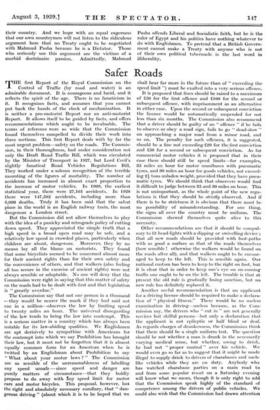The Egyptian Question
ONE clear impression left upon us by the enforced resignation of Lord Lloyd, and the consequent debates in Parliament, is that the late Unionist Govern- ment may, through their dissensions, have missed a first- rate opportunity of carrying through a Treaty with Egypt. And this in spite of the fact that the rejection of the Sarwat Treaty in 1927 was mainly due to the folly of the Wafd.
The Unionist Cabinet as a whole and Lord Lloyd seem to have agreed on very few points ; he was for what is called a " firm " policy, but Sir Austen Chamberlain distinctly and creditably inclined to what is called a " liberal " policy. There was no outward evidence at the time of the rift, but, looking back on the events of the past two years, in the light of what was said by Mr. Churchill in the House of Commons last week, and by Lord Birkenhead and Lord Salisbury in the House of Lords, we have no doubt that Lord Lloyd had his backers, as well as his opponents, in the late Cabinet. The Egyptian question divided the Cabinet into two camps, one of which was fairly represented in last week's debate by Mr. Baldwin's very reasonable comments, and the other by the unfortunate tirade of Mr. Churchill.
Every normal person admires loyal friendship, and, in so far as Mr. Churchill and Lord Birkenhead were " standing up " for Lord Lloyd as his close personal friends they appeared in an admirable part ; but it is necessary to distinguish between a national interest and a personal interest. Mr. Churchill and Lord Birkenhead, by over-emphasizing the personal interest created a harmful public scandal—the very thing which they deprecated. There was really no question—though that question was falsely posed—of the High Com- missioner not having the right freely to state his opinions. The man on the spot fails in his duty if he does not make full use of his first-hand information. But it had already become evident when the present Government took office that Lord Lloyd was generally out of sympathy with Sir Austen Chamberlain's " liberal " policy, and, obviously, there was little chance of sympathy with the rather more " liberal " policy of the present Government. We agree with Mr. Henderson that when conciliation is the work in hand the conciliatory temper of the agent is a primary consideration. It is not necessarily a con- demnation of Lord Lloyd to say that he was without conciliatory convictions in regard to Egypt. He had the right to his own judgment, and his proved courage and energy would make him a valuable administrator under different conditions. Indeed, we wish that it had been possible for the Government to offer him there and then some other post. Thus they might have avoided the mischievous rumours which are bound to be set afloat by a sudden procured resignation.
All these matters were unhappily obscured rather than illumined by Mr. Churchill's outburst. His accusation against the Foreign Office of making Lord Lloyd the victim of their jealousy was highly improper. His phrase about a policy of " sloppy surrender and defeat."
in regard to Egypt was singularly unfortunate. Ex- Cabinet Ministers 'are expected to 'act with circumspec- tion., even when availing themselves of the maxim that it is .the duty of an Opposition to oppose. Mr. Churchill's incurable &light in fighting for fighting's sake remains ; one cannot help seeing, however regretfully; the reason why general opinion excludes hini. from the highest poSt of political leadership. Mr. Churchill weakened his own party rather than the Government, whom, indeed, he helped to an adventitious success.
Anybody who rereads the history of countries which have been disloyal or uncomfortable in their attachments to Great Britain, must see that the argument that it would be too great a " risk " to remove the causes of disloyalty or discomfort has nearly always been wrong. When Sir Henry Campbell-Bannerman decided in favour of the policy of trusting South Africa, it was widely believed here that he was sentimentally heading for disaster. We confess that we had grave doubts ourselves. It is clear now that no other policy could have led so quickly and surely to the new doctrine that the British Commonwealth of Nations consists of equal self-govern- ing nations. The " risk," again, was accepted in the case of Ireland—accepted with the approval and assist- ance of many politicians who had been life-long supporters of the Union—and again with success. The Egyptian pro- blem is peculiarly a case for accepting a " risk," because Egypt, under the Declaration of 1922, was granted " independence." If that word is treated as having no meaning Great Britain will be accused of bad faith. The Egyptian problem will drift from bad to worse.
Responsible Egyptians admitted the force of the four reservations made by Great Britain in 1922, as fairly describing the commitments of which Great Britain could not possibly disembarrass herself. Those reserva- tions referred to the maintenance of British communica- tions with the East, the defence of Egypt against aggres- sors, the protection of foreign nationals, and the Sudan. The first reservation in regard to our communications is as much an Egyptian interest as a British interest, for the defence of Egypt would be impossible if we lost control of the Suez Canal. In 1924 the Labour Govern- ment were as firm as the Unionist Government had been on the importance of the four points. Mr. Henderson said last week that there will be " no change of policy." If the disclosures in Egyptian newspapers about the discussion of a Treaty in London are credible—and we are not ourselves disposed to doubt them—Mr. Henderson must mean that although the old policy is to stand, it may be made secure by rather different means from those originally contemplated.
For instance, it may be necessary to remove British troops from Cairo and the interior of Egypt and concen- trate them in the Canal zone. The old objection that this will not safeguard the fresh water supply will, of course, be raised, but let us remember that aeroplanes have brought the Canal within a short distance of the capital. The " risk," whatever it may be, is preferable to the risk of seeming to deny Egyptian independence. Again, if the Capitulations are to be abolished, it will be said, " Will not other Powers complain that Great Britain is not fulfilling her pledge to protect their nationals ? " That reasonable question deserves a reason- able answer, and the Government must certainly give it. If Egypt should become a member of the League it might be possible, we suggest, to afford some new kind of protection from Geneva. There will no doubt be an ample opportunity for debate, as the Government have promised to let Parliament discuss the Treaty before ratification.
We sincerely hope that the Wafd will support Mahmud Pasha, the Egyptian Prime Minister, when he summons and appeals to Parliament in a few weeks. They will be able to do a great day's work, or a very bad -one, for their country. And we hope with an equal eagerness that our own countrymen will not listen to the ridiculous argument here that no Treaty ought to be negotiated with Mahmud Pasha because he is a Dictator. Those who seriously use this argument are the victims of a morbid doctrinaire passion. Admittedly, Mahmud Pasha offends Liberal and Socialistic faith, but he is the ruler of Egypt and his politics have nothing whatever to do with Englishmen. To pretend that a British Govern- ment cannot make a Treaty with anyone who is not of their own political tabernacle is the last word in illiberality.



































 Previous page
Previous page